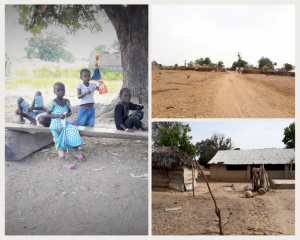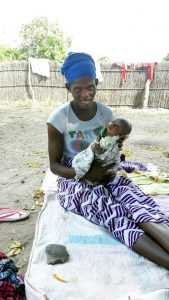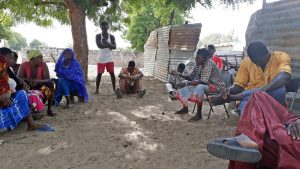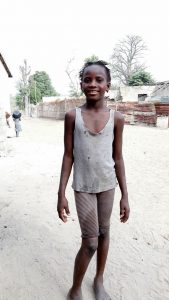This project is made possible through the partnership of WATER CHARITY and the NATIONAL PEACE CORPS ASSOCIATION.![]()
This project has been completed. To read about the conclusion, CLICK HERE.
 Location
Location
Salikenneh Village, Sami District, Central River Region, The Gambia
Community Description
Salikenneh village is a remote community located about 6 kilometers off Jarumeh Koto along the North Bank Road. The community is made up of 400 people primarily from the Mandinka tribe whose livelihoods are based on subsistence farming. There is a lack of formal education in the community, and hence a high level of illiteracy. In fact, due to the remoteness of the area, most of the community’s children have no access to formal education. The nearest school is in Jarumeh Koto about 6 kilometers away on a forest path. Recently, NGOs have worked to sensitize the community to the importance of education, especially of girls.
Problem Addressed
There is only one working well in the community, which is insufficient to meet the community’s demands for drinking water, not to mention for other household chores. The community is experiencing a severe water shortage. The community uses donkey carts to travel about 6 km to Jarumeh Koto to fetch water.
 The pressure of Salikenneh community members on Jarumeh Koto’s water system has persisted for long enough that they often face a backlash from the Jarumeh community, which is also frustrated by their conditions of limited water resources. This has resulted in the segregation of and/or discrimination against the Salikenneh community.
The pressure of Salikenneh community members on Jarumeh Koto’s water system has persisted for long enough that they often face a backlash from the Jarumeh community, which is also frustrated by their conditions of limited water resources. This has resulted in the segregation of and/or discrimination against the Salikenneh community.
According to the Public Health officer covering the district, the community has a high rate of diarrhea and other water-related illnesses due to poor water quality. Male children spend most of their time working with their parents on the groundnut and maize fields while girls spend hours in the queue to collect water for household use.
The community doesn’t see education as a priority; they certainly don’t see educating their girls as a priority. Recently, with the intense sensitization by various NGOs, some parents are beginning to send their children to school. However, more needs to be done.
 Project Description
Project Description
The project is to drill a 6-inch diameter borehole to a depth of 45 meters and install a hand pump.
The project will also include the construction of a concrete slab to cover the well, as well as a protection fence for the handpump. A brand new German Mark II handpump will be mounted.
A 2.4-meters by 1.5-meter-long concrete trough will be constructed as a drinking point for livestock. The system will supply abundant clean water for the villagers during the entire year and will help in the rearing of ruminants. The trough, directed away from the well, provides a reliable water point for animals to drink from without danger of contaminating the well water. As a result, it will help to reduce poverty and malnutrition in the community.
Gravel, sand, cement, iron rods and the making of bricks will be provided by the community as their contribution toward the project. Any needed manual labor will also be provided by the community. They will also host and feed the workers.
Water Charity funds will be used to pay for materials and skilled labor.
Project Impact
400 people will benefit from the project.
Project Administration
Emily Lundberg, Ph.D., Water Charity Country Director – The Gambia, working with Mike McConnell, Managing Trustee of GambiaRising and former Country Director for Peace Corps in The Gambia, and Ebrima Marong, Water Charity Program Manager.
 Monitoring and Maintenance
Monitoring and Maintenance
A five-member water management committee has been set up, dominated by females and headed by Mrs. Fatou Ceesay and Deputy Mrs. Khadijatou Dem. The committee consists of serious and dedicated people chosen by the villagers in a meeting held at the village ‘Bantaba’ (meeting place). The selection of the committee members was gender balanced. Given that women bear the brunt of water collection in the households, they should have a say when it comes to water management issues.
A training workshop will be conducted for them on the community management model techniques to ensure sustainability. At the same meeting, the committee agreed that at the end of every month each household will pay some amount.
A bank account will be opened by the village water committee, with three mandatory signatories, where the collected amount will be saved for future maintenance and repair or any future upgrades, if necessary. The committee will report monthly to the villagers—in total transparency—at the village Bantaba to be coordinated by the Alkalo (village head). By way of this governance mechanism, the community will maintain a sense of ownership of and responsibility towards the upkeep of the water source, thus ensuring sustainability.
Water Charity Program Manager Ebrima Marong will visit the community regularly to ensure the system is working and to verify that the water management committee is working effectively and transparently.
Let Girls Learn
This project is expected to have a big impact on girls’ education. According to the Jarumeh Koto Basic Cycle School, only 29 children are coming from Salikenneh to attend school, of which 13 are girls. They expect the number to increase after this water project is complete and functioning. The burden of water collection will be off the girls’ shoulders, which means they can now access education and proper sanitation.
For example, Oumie is an 11-year-old schoolgirl in the Salikenneh community. She has to get up as early as 5 AM to fetch water for household chores she must complete before going to school. When she’s done, she takes shower and walks 6 km to school. Oumie’s teacher said she struggles to concentrate in class, clearly feeling sleepy. Her performance has dwindled and, if the situation continues, her parents might see her as unsuccessful or not clever enough to be in school. They might conclude that her only chance at a good life is to get married at an early age and begin bearing children. Hopefully, when this water project is complete, Oumie’s and others’ lives will change for the better.
Fundraising Target
$7,100
Donations Collected to Date
$7,100
Dollar Amount Needed
$0 – This project has been funded by an anonymous donor. If you think this is a great project, click the DONATE NOW button. Your contribution will be used to fund the next project in line in our Water for Everyone – The Gambia Program.